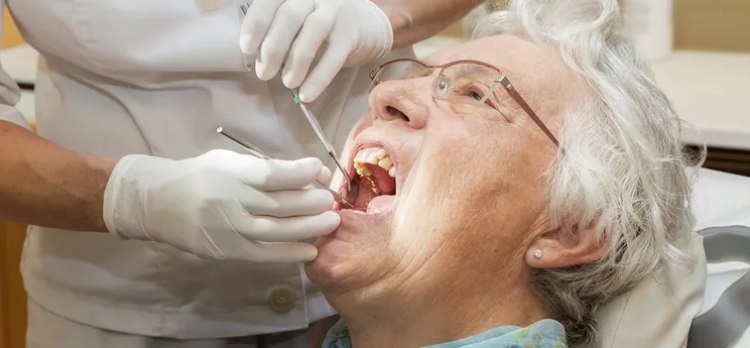Australian dentists seeking a national seniors’ dental benefits scheme could get the backing of a royal commission.
Counsel assisting the Royal Commission into Aged Care Quality has recommended a revamp of dental care funding, backing a submission made by the Australian Dental Association (ADA). The association is urging the royal commission to include the seniors’ scheme in its final recommendations to government when it reports in February.
It is seeking Medicare-funded oral health assessments by registered dentists for those aged over 75. The aim is to reduce the “unmet oral healthcare needs of older Australians”.
The ADA also advocates that every person entering a residential aged care facility should have an “oral health assessment by a registered dental practitioner to inform their ongoing oral hygiene measures”.
“Whilst Medicare looks after the general health of our older adults – the mouth gets left behind.”
ADA president Dr Carmelo Bonanno welcomed counsel assisting the royal commission’s support for a dental overhaul for older Australians, calling the model the “most realistic option for funding dentistry for older Australians”.
“Creating such a scheme is critical to building better oral health among older Australians before and after they enter residential care …” Dr Bonanno said.
“Without the funding mechanism to ensure that older Australians can access screening and treatment through both public and private dental practitioners, the oral health of our most vulnerable population will continue to be neglected.
“It’s particularly important for those older Australians receiving home care or going into aged care facilities that their oral health issues are assessed and treated and that they receive ongoing care to ensure they can continue to eat, speak, socialise and be free from pain.”
Australia’s most recent dental report revealed an “oral health crisis” of tooth decay and gum disease among Australian adults, with one in three of us enduring untreated tooth decay, and one in four suffering periodontal (gum) disease. Both are treatable conditions.
In July, the Sydney Morning Herald reported that more than 50 per cent of Australians without dental healthcare insurance were postponing or avoiding treatment because of cost. Even many of those with insurance found out-of-pocket fees or gap costs a disincentive for treatment.
It quoted a report by the Australian Institute for Health and Welfare (AIHW) on oral health and dental care.
AIHW spokesperson Dr Adrian Webster said poor oral health compromised a person’s quality of life.
“For many Australians, cost may be a barrier to ensuring they receive the care they need, when they need it,” he said.
Dr Webster said 52 per cent of people without insurance and 26 per cent of people with insurance said they avoided the dentist because of the cost.
The report revealed that “many people who had avoided or delayed visiting a dentist in 2017-2018 because of cost had only visited in the past when they needed urgent treatment. People on low incomes were also much more likely to skip visits.”
An SBS Insight program on dental health concluded that in 2018 two million Australians missed out on dental care because of the cost.
“Although oral health affects overall health, the mouth is treated differently to the rest of the body, with no universal health scheme like Medicare covering it.”
Why dental health is crucial (AIHW)
The most common oral diseases affect the teeth (tooth decay, called ‘caries’) and gums (periodontal disease). Oral disease can destroy the tissues in the mouth, leading to lasting physical and psychological disability. Tooth loss can reduce the functionality of the mouth, making chewing and swallowing more challenging, which in turn can compromise nutrition. Poor nutrition can impair general health and exacerbate existing health conditions. Poor oral health is also associated with several chronic diseases, including stroke and cardiovascular disease.
Poor oral health can also affect a person’s wellbeing. Dental disease can impair a person’s appearance and speech, eroding their self-esteem, which in turn can lead to restricted participation at school, the workplace, home, and other social settings.
Adult Oral Health Tracker report key findings (ADA)
- the number of adults with untreated and potentially painful tooth decay has increased from 25.5 per cent to 32.1 per cent
- adults with periodontal pockets larger than 4mm, which can lead to tooth loss, rose from 19.8 per cent to 28.8 per cent
- adults reporting toothache went up from 16.2 per cent in 2018 to 20.2 per cent in 2020
- nearly half (48.8 per cent) of adults surveyed had visited a dentist for a check-up in the past 12 months, a drop of 6.7 per cent since 2018
- only 53 per cent of Australian adults are brushing their teeth twice a day.
Have you skipped dental check-ups because of cost? Have you experienced problems as a result? Would you welcome a Medicare-style scheme?
If you enjoy our content, don’t keep it to yourself. Share our free eNews with your friends and encourage them to sign up.
Related articles:
https://www.yourlifechoices.com.au/health/news-health/more-medicarefunded-dental
https://www.yourlifechoices.com.au/health/health-essentials/unnecessary-dental-treatments
https://www.yourlifechoices.com.au/travel/max-drills-into-dental-tourism

